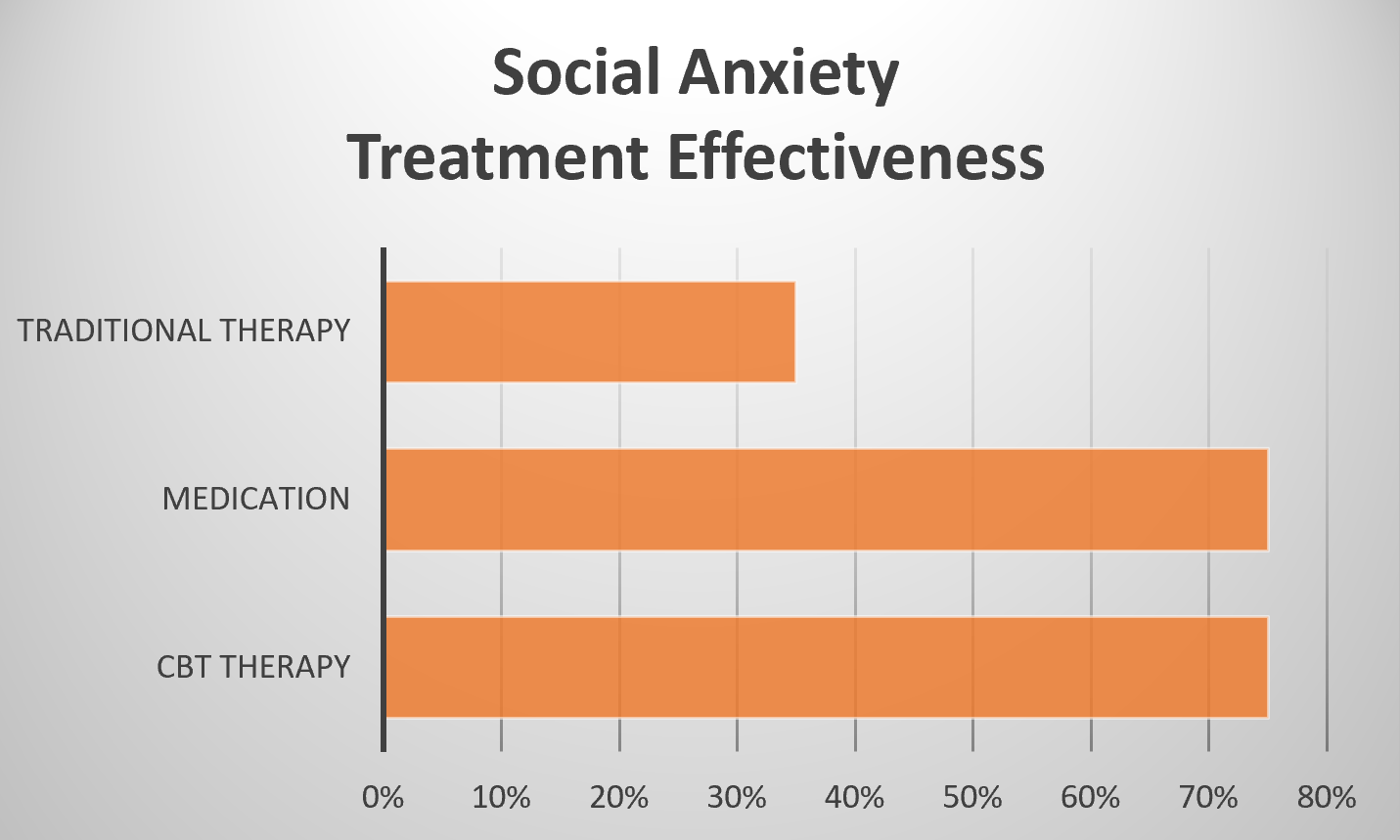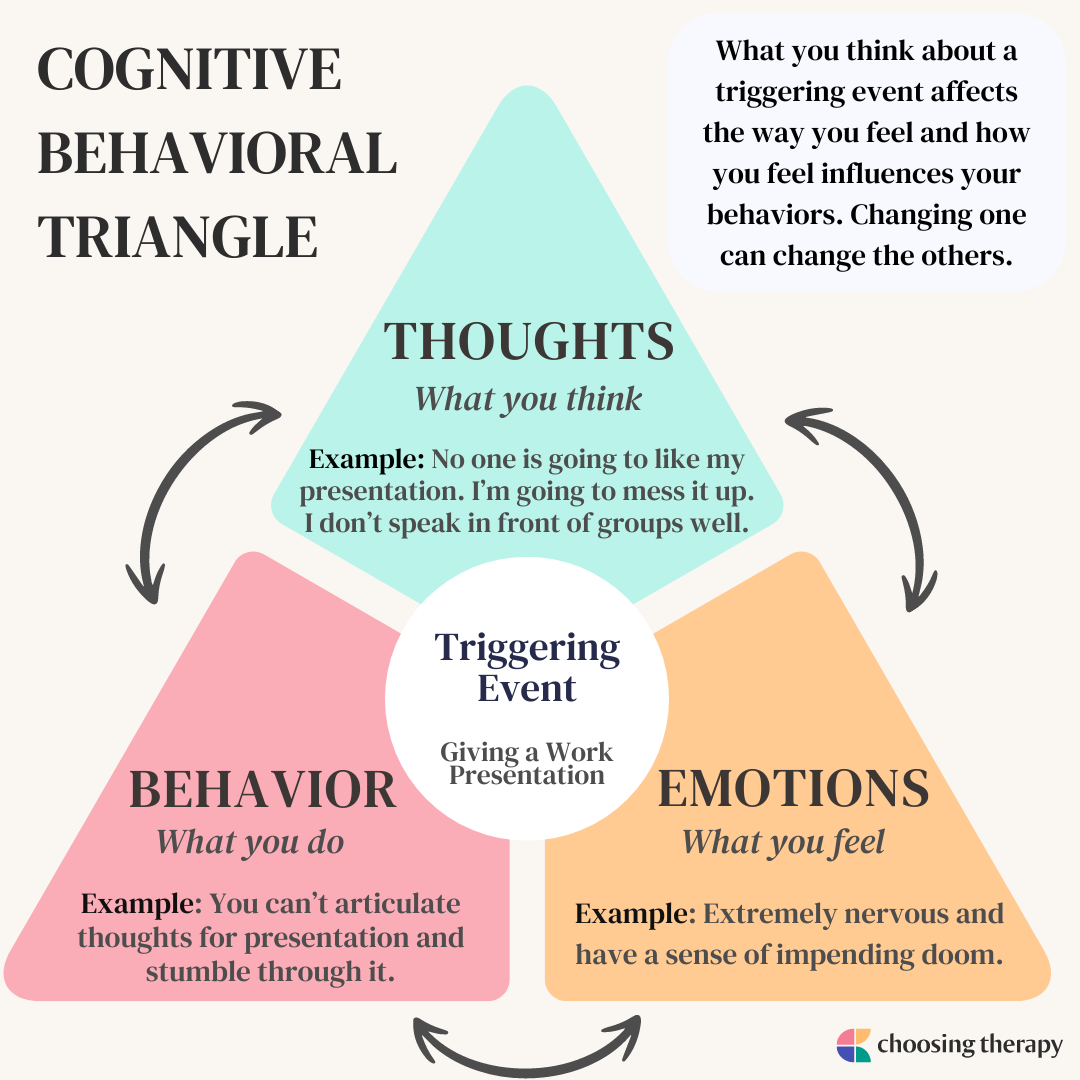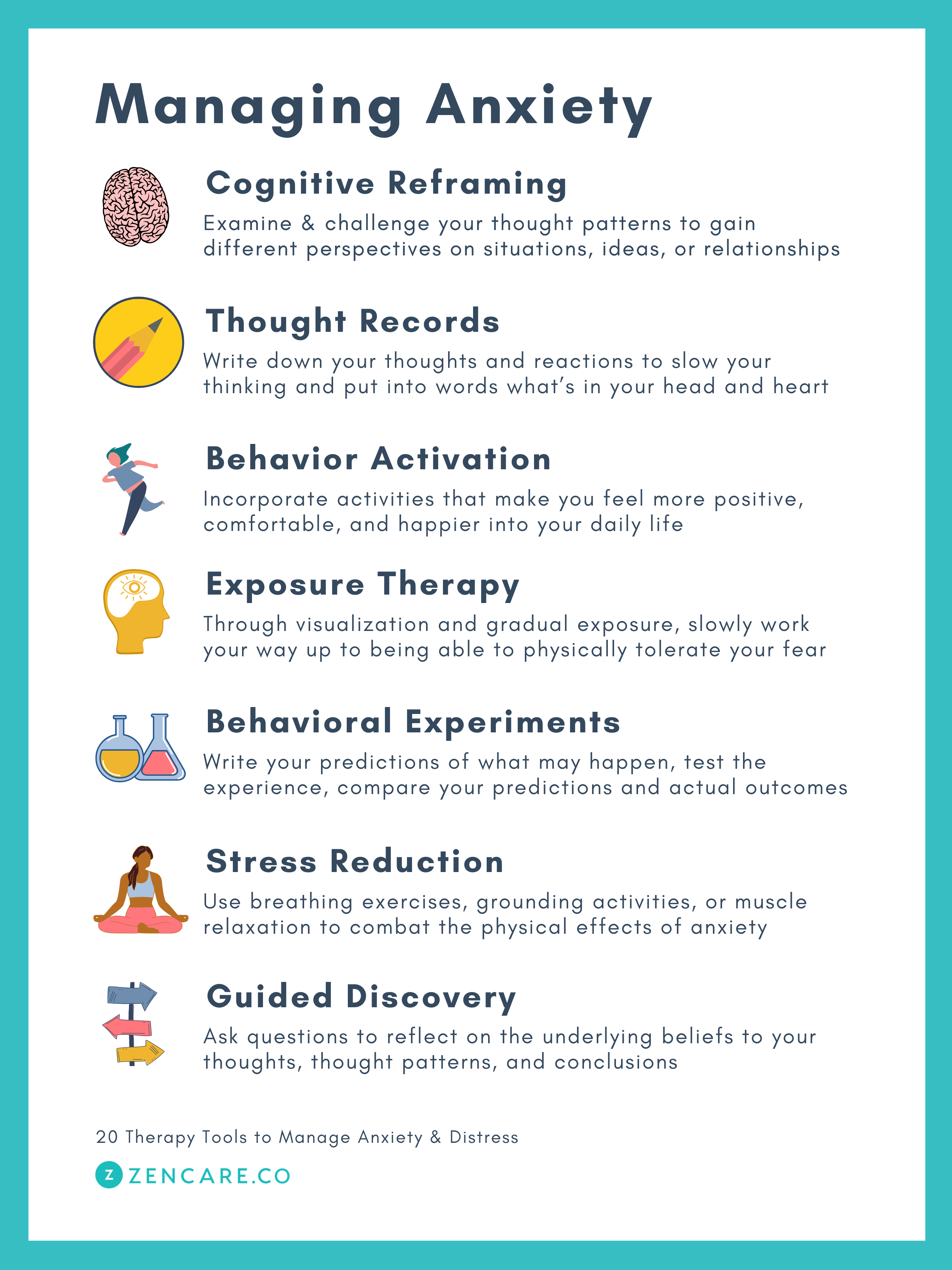Explore effective techniques through counselling for anxiety disorder programs
Exploring Various Approaches in Counselling for Anxiety Problem for Enduring Adjustment
When taking on stress and anxiety conditions, it's vital to explore a selection of therapy strategies. Each technique supplies one-of-a-kind understandings and tools to assist you handle your signs efficiently. You could discover that combining strategies can yield the ideal results. Recognizing the subtleties of these approaches is key to fostering enduring change. Suppose the appropriate combination could launch a brand-new degree of psychological well-being for you?
Recognizing Anxiousness Conditions: A Brief Overview
Stress and anxiety disorders, which impact millions of individuals worldwide, can greatly influence day-to-day live. You may experience overwhelming feelings of fear or fret that seem uncontrollable. These feelings can bring about physical signs like an auto racing heart, sweating, or even dizziness. Typical kinds of stress and anxiety conditions consist of generalized stress and anxiety disorder, panic problem, and social anxiety disorder. Each has one-of-a-kind indications, however they all share a propensity to interrupt your regular and relationships.Understanding the origin of your anxiousness is essential. It might stem from genetics, brain chemistry, or life experiences. Recognizing your triggers can aid you handle your actions better. It is necessary to keep in mind that you're not alone in this struggle. Lots of people deal with comparable difficulties, and looking for assistance is a strong action toward feeling much better. By finding out about anxiety disorders, you're currently on the course to understanding and handling your problem better.
Cognitive-Behavioral Treatment: Testing Negative Idea Patterns
In Cognitive-Behavioral Therapy, you'll start by recognizing the adverse thought causes that add to your stress and anxiety. You'll function on changing them with even more positive options as soon as you identify these thoughts. Together, you'll build reliable coping approaches to help manage your anxiousness in everyday scenarios.
Identifying Unfavorable Idea Triggers

When you experience minutes of distress, recognizing the certain triggers behind your adverse ideas can be essential in handling anxiety. Begin by taking notice of situations that provoke feelings of worry or concern. Is it a crowded area, an upcoming due date, or a discussion with specific individuals? Take down these circumstances in a journal. This will certainly aid you determine patterns in your thinking. Notification physical feelings that accompany your unfavorable thoughts, like an auto racing heart or tightness in your upper body. By determining these triggers, you gain insight into what's fueling your stress and anxiety. Understanding these connections is the initial step in challenging those thoughts and ultimately restoring control over your emotional actions.
Replacing Thoughts With Positives
Challenging unfavorable thought patterns is an important action in changing your frame of mind and decreasing anxiousness. You might typically locate on your own caught in cycles of insecurity or catastrophic reasoning. Rather than letting these ideas dictate your feelings, practice replacing them with sensible alternatives or positive affirmations. As an example, when you think, "I can't manage this," move it to, "I can manage obstacles one action at once." This simple adjustment can significantly affect your mood. Frequently identifying and responding to these negative ideas aids develop a much healthier internal discussion. Keep in mind, it requires time and initiative, however regularly exercising this method can result in long-term adjustment, empowering you to face anxiety with renewed self-confidence and strength.
Structure Coping Strategies Together
Replacing adverse thoughts is just the beginning of handling stress and anxiety effectively. To create long lasting modification, you require to build coping techniques that equip you. Cognitive-Behavioral Therapy (CBT) assists you recognize and challenge those unhelpful thought patterns. With each other, you and your therapist can discover just how these ideas impact your feelings and behaviors.Start by developing useful strategies, like journaling or mindfulness workouts, that allow you to confront anxiousness head-on. When you encounter your fears progressively, you'll discover to respond in different ways.

Mindfulness and Acceptance-Based Approaches: Growing Present-Moment Recognition
As you navigate the complexities of anxiousness, including mindfulness and acceptance-based methods can substantially improve your capability to cultivate present-moment understanding. By concentrating on the present moment, you'll locate that you can observe your ideas and feelings without judgment (Counseling services for anxiety). This practice helps you recognize your stress and anxiety without feeling bewildered by it.Engaging in mindfulness workouts, such as deep breathing, body scans, or directed meditations, permits you to ground on your own in your existing experience. Acceptance-based strategies encourage you to welcome your feelings instead of battle against them. They lose their power over you.Incorporating these techniques right into your everyday regimen can transform exactly how you react to anxiousness when you accept your sensations. You'll establish resilience and discover to browse demanding circumstances with greater convenience. Inevitably, cultivating present-moment understanding lays the structure for lasting modification, equipping you to lead a more meeting life
Exposure Treatment: Challenging Concerns Progressively
Direct exposure therapy assists you confront your anxieties in a progressive way, making it much less overwhelming. You'll learn strategies to deal with anxiety-provoking situations step by step, while additionally constructing coping strategies to manage your responses. This strategy equips you to take control and lower stress and anxiety with time.
Progressive Direct Exposure Techniques

When encountering anxiety, progressively facing your concerns can be a powerful method to gain back control. This strategy, called gradual direct exposure, entails slowly subjecting on your own to the situations or things that trigger your anxiousness. Start with much less intimidating situations and gradually function your means up to even more challenging ones. For instance, if you're worried of public speaking, you might begin by speaking in front of a mirror, after that proceed to sharing ideas with a good friend, and at some point address a small team. Each step assists desensitize you to the fear, constructing your self-confidence gradually. Remember, it's necessary visit this page to rate yourself and celebrate little victories as you relocate through this process, reinforcing your capacity to take care of anxiety properly.
Structure Coping Strategies
Building efficient coping approaches is vital for taking care of anxiousness, especially as you challenge your worries slowly - Counseling services for anxiety. One effective approach is exposure therapy, where you start by encountering your fears in a controlled manner. Begin with less daunting circumstances and slowly work your method as much as even more challenging situations. This progressive exposure aids desensitize you to anxiousness causes, making them much less overwhelming.Incorporate leisure strategies, such as deep breathing or mindfulness, to relax your mind throughout direct exposure. Track your progression, celebrating little success along the road to increase your confidence. Remember, it's alright to take your time; the goal isn't perfection yet constant enhancement. By constructing these approaches, you'll encourage yourself to navigate anxiousness and embrace life more fully
Psychodynamic Treatment: Discovering Source of Anxiety
Psychodynamic treatment checks out the unconscious mind, exposing the origin causes of your anxiety. By examining your ideas, feelings, and previous experiences, this technique aids you discover underlying conflicts and unresolved problems that may contribute to your existing anxiousness. You'll deal with a specialist to examine childhood years experiences, relationships, and psychological patterns that form your actions today.As you get insight into these deeper layers of your psyche, you'll begin to identify how previous events influence your present habits. This understanding can lead to catharsis, enabling you to process emotions you might have suppressed.Through the restorative connection, you can additionally recognize defense reaction that might have developed with time, offering a more clear course to change. Ultimately, psychodynamic treatment furnishes you with the tools to address your stress and anxiety at its core, promoting long lasting improvement in your psychological well-being.
Integrative and Holistic Techniques: Integrating Strategies for Greater Effectiveness
Incorporating various healing methods can enhance your journey toward managing stress and anxiety better. By incorporating elements from cognitive-behavioral therapy, mindfulness practices, and alternative techniques, you can produce a customized approach that addresses your unique demands. As an example, you might make use of cognitive-behavioral techniques to challenge unfavorable thought patterns while including mindfulness workouts to ground yourself in the present moment.Additionally, checking out all natural techniques such as yoga exercise or meditation can promote relaxation and minimize anxiousness signs and symptoms. This mix allows you to establish higher self-awareness and resilience.Experimenting with these varied methods can help you uncover what reverberates most with you. Bear in mind, it's about finding a harmony that functions, instead of staying with a solitary method. This integrative technique not only supplies instant relief but additionally promotes long-lasting skills for managing anxiety, encouraging you to redeem control over your life.
The Function of Support Equipments: Structure Durability Through Link
While it may seem that handling anxiety is a singular journey, having a strong support group can play an essential role in your strength. Surrounding on your own with compassionate close friends, family, or support system creates a risk-free space where you can freely share your experiences and sensations. You remind on your own that you're not alone in this struggle.These relationships supply support and can provide functional coping strategies that have functioned for others when you connect with others. It's likewise an opportunity to acquire viewpoint; buddies can aid you see circumstances in different ways, decreasing sensations of isolation.Moreover, psychological assistance promotes a sense of belonging, which can significantly relieve anxiety signs. By leaning on your assistance system, you can build durability and take on obstacles a lot more efficiently. Remember, getting to out for aid signifies strength, and it can make all the difference in your journey towards taking care of anxiety.
Regularly Asked Inquiries
What Are the Common Symptoms of Stress And Anxiety Conditions?
You might experience uneasyness, tiredness, trouble focusing, impatience, muscle stress, and rest disturbances. Physical signs can consist of quick heartbeat, sweating, and trembling. Acknowledging these indications early can assist you seek suitable assistance and therapy.
How Much Time Does Treatment Typically Last for Stress And Anxiety Problems?
Treatment for anxiousness problems typically lasts anywhere from a few weeks to several months. It really depends on your individual demands, progression, and the strategies your specialist makes use of to assist you manage your anxiety properly.
Can Drug Be Utilized Along With Therapy for Anxiousness?
Yes, drug can most definitely be utilized together with therapy for anxiety. Integrating both methods frequently enhances therapy efficiency, assisting you manage symptoms while discovering underlying problems through counseling (Counseling services for anxiety). Always consult your medical care click for info copyright for individualized guidance
Are There Self-Help Techniques for Taking Care Of Stress And Anxiety?
Yes, there are several self-help methods for handling anxiousness. You can practice mindfulness, involve in routine exercise, keep a balanced diet, develop a routine, and make use of deep breathing techniques to help in reducing stress and anxiety symptoms successfully.
How Do I Know if I Required Specialist Assistance for Stress And Anxiety?
